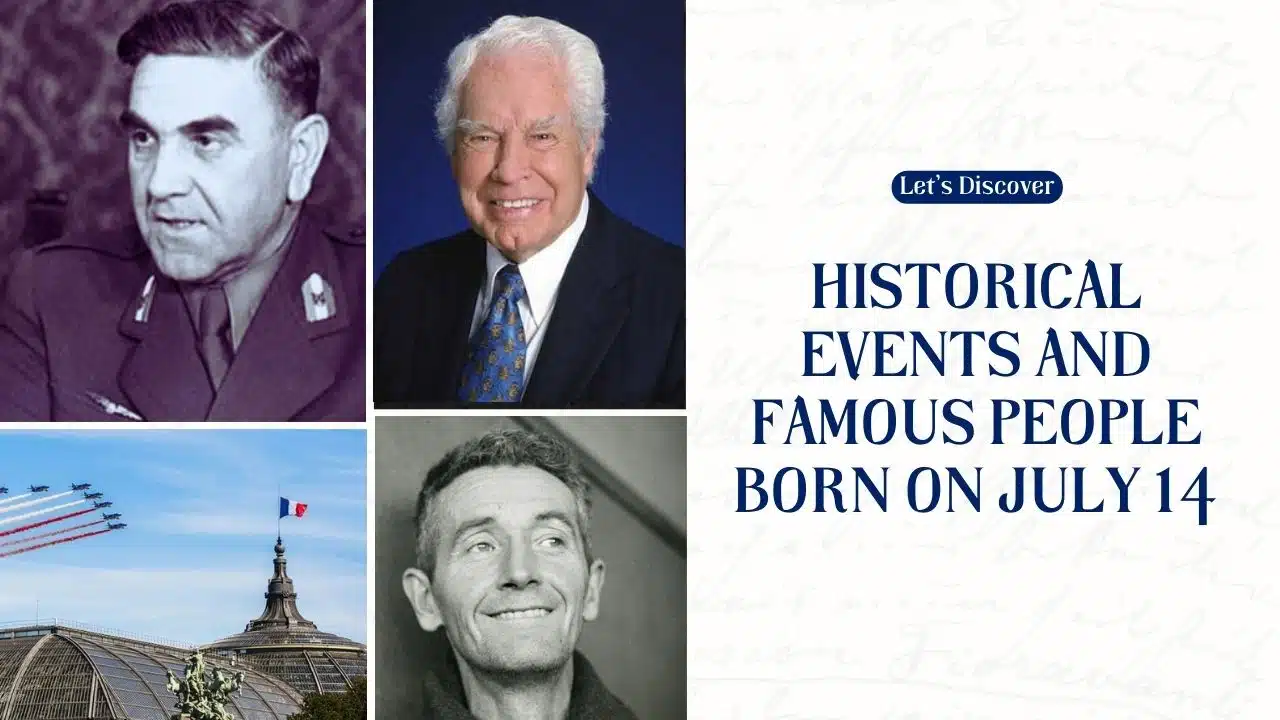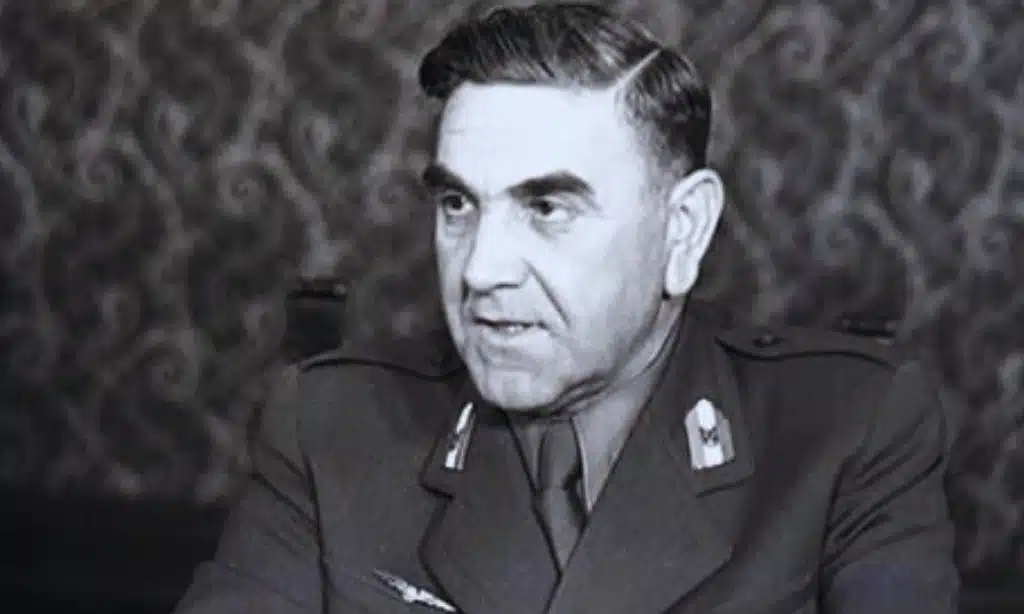July 14 is a day that has seen many important events in history. It’s also the birthday of some very famous people. This article will talk about the big things that happened on July 14 and the important people born on this day.
Historical Events on July 14
The Conquest of Tunis (1535)
In 1535, Emperor Charles V took over the city of Tunis. Charles V was a powerful ruler who controlled a lot of Europe and parts of the Americas. He wanted to stop the Ottoman Empire from getting stronger in North Africa.
Taking Tunis was a big deal because it helped Spain control more of the Mediterranean Sea. This made it harder for Ottoman ships to attack European coasts. It also helped protect Christian ships that were sailing in the area.
Introduction of the Standardized Roman Missal (1570)
On July 14, 1570, Pope Pius V made a big change to how Catholic mass was done. He introduced a standard Roman Missal. A missal is a book that has all the words and instructions for Catholic mass.
This change came from the Council of Trent, which was a meeting of Catholic leaders. They wanted to make sure all Catholic churches were doing things the same way. This new missal was used for 400 years without any big changes. It helped keep Catholic services the same all over the world.
Bastille Day (1789)
July 14, 1789, was a very important day in French history. On this day, people in Paris attacked a prison called the Bastille. This event started the French Revolution.
The Bastille was a symbol of the king’s power. When people attacked it, they were showing they were tired of how the king was ruling. They wanted more freedom and equality.
This day is now celebrated as France’s national day. It’s called “Bastille Day” in English, but in France, it’s known as “La Fête Nationale” or “Le 14 Juillet”. People have parades, fireworks, and parties to remember this important day in their history.
Fête de la Fédération (1790)
One year after the attack on the Bastille, on July 14, 1790, France had a big celebration. It was called the Fête de la Fédération. This was to mark the first anniversary of the start of the French Revolution.
What made this event special was that King Louis XVI and his wife Marie Antoinette were there. They took an oath to support the new constitution. This was a big deal because it showed the king agreeing to share power with the people.
The celebration happened all over France. It was meant to show that all French people were united. However, this unity didn’t last long. Within a few years, the king and queen were removed from power.
The Priestley Riots (1791)
On July 14, 1791, riots broke out in Birmingham, England. These were called the Priestley Riots. They were named after Joseph Priestley, a scientist and supporter of the French Revolution.
Priestley and his friends were having a dinner to celebrate Bastille Day. But many people in England were scared of the French Revolution. They thought it might spread to England. So they attacked Priestley’s house and other places in Birmingham.
Because of these riots, Priestley had to leave Birmingham. He later moved to America. These riots showed how the French Revolution was causing fear and anger even in other countries.
Famous Birthdays on July 14
Gertrude Bell (1868-1926)
| Full Name | Gertrude Margaret Lowthian Bell |
| Born | July 14, 1868, in Washington Hall, County Durham, England |
| Died | July 12, 1926 (aged 57) in Baghdad, Iraq |
| Known For | Archaeology, writing, political officer, spy |
| Notable Work | “The Desert and the Sown” |
Gertrude Bell was a British woman who did many interesting things. She was an archaeologist, which means she studied old buildings and objects. She wrote a famous book called “The Desert and the Sown” about her travels in the Middle East.
Bell was also important in British politics in the Middle East. She helped draw the borders of Iraq after World War I. She worked with local leaders and British officials to set up the new country of Iraq.
Bell was unusual for her time because she was a woman doing jobs that were usually done by men. She spoke many languages and traveled to places that were dangerous. Her work helped Britain understand more about the Middle East.
Ante Pavelić (1889-1959)
| Full Name | Ante Pavelić |
| Born | July 14, 1889, in Bradina, Austria-Hungary (now Bosnia and Herzegovina) |
| Died | December 28, 1959 (aged 70) in Madrid, Spain |
| Known For | Leader of the Independent State of Croatia during World War II |
| Political Party | Ustaše |
Ante Pavelić was a Croatian political leader. He was born when Croatia was part of Austria-Hungary. Pavelić became the leader of Croatia during World War II, from 1941 to 1945.
Pavelić’s government was supported by Nazi Germany. This means he worked with Adolf Hitler. His rule was very strict and many people suffered during this time. He led a group called the Ustaše, which did many bad things to people who were not Croatian.
After World War II ended, Pavelić had to leave Croatia. He lived in different countries to avoid being caught. Many people remember him as a cruel leader who hurt a lot of people.
William Hanna (1910-2001)
| Full Name | William Denby Hanna |
| Born | July 14, 1910, in Melrose, New Mexico, USA |
| Died | March 22, 2001 (aged 90) in Los Angeles, California, USA |
| Known For | Co-founder of Hanna-Barbera, creator of many famous cartoons |
| Notable Works | Tom and Jerry, The Flintstones, Scooby-Doo |
William Hanna was an American animator. He made cartoons that many people love. Hanna started working in animation in the 1930s. In 1937, he met Joseph Barbera, and they became a team.
Hanna and Barbera created many famous cartoons. Their first big success was “Tom and Jerry”. These cartoons showed a cat (Tom) trying to catch a mouse (Jerry). They were very popular and won seven Academy Awards.
In 1957, Hanna and Barbera started their own company called Hanna-Barbera. They made many famous TV cartoons like “The Flintstones”, “Yogi Bear”, and “Scooby-Doo”. These shows were loved by children and adults.
Hanna’s work changed how cartoons were made for TV. He found ways to make cartoons faster and cheaper, which helped create many more cartoon shows. His characters are still popular today, many years after they were first created.
Woody Guthrie (1912-1967)
| Full Name | Woodrow Wilson Guthrie |
| Born | July 14, 1912, in Okemah, Oklahoma, USA |
| Died | October 3, 1967 (aged 55) in New York City, New York, USA |
| Known For | Folk music, songwriting, social activism |
| Notable Works | “This Land Is Your Land”, “Dust Bowl Ballads” |
Woody Guthrie was an American folk singer and songwriter. He was born in Oklahoma and lived during the Great Depression. This was a time when many people in America were very poor.
Guthrie wrote songs about the problems he saw. His most famous song is “This Land Is Your Land”. Many people think of it as another national anthem for America. He wrote about workers, poor people, and the beauty of America.
Guthrie’s music was simple but powerful. He often played a guitar that had the words “This Machine Kills Fascists” written on it. This showed that he believed music could help change the world.
Many later musicians were inspired by Guthrie. His son, Arlo Guthrie, also became a famous folk singer. Woody Guthrie’s songs are still sung today and he is remembered as one of the most important American folk musicians.
Gerald Ford (1913-2006)
| Full Name | Leslie Lynch King Jr. (changed to Gerald Rudolph Ford Jr.) |
| Born | July 14, 1913, in Omaha, Nebraska, USA |
| Died | December 26, 2006 (aged 93) in Rancho Mirage, California, USA |
| Known For | 38th President of the United States (1974-1977) |
| Political Party | Republican |
Ford entered politics and became a member of the House of Representatives. He was there for 25 years. In 1973, he became Vice President when Spiro Agnew resigned. Then, in 1974, he became President when Richard Nixon resigned because of the Watergate scandal.
Ford is the only person to have been both Vice President and President without being elected to either job. As President, he tried to help the country move past the Watergate scandal. He also dealt with economic problems and the end of the Vietnam War.
One of Ford’s most famous decisions was to pardon Richard Nixon. This meant Nixon wouldn’t be put on trial for the Watergate scandal. Many people were angry about this, but Ford thought it would help the country heal.
Ford ran for election as President in 1976 but lost to Jimmy Carter. After leaving office, he stayed active in public life and wrote books about his experiences.
Takeaway
July 14 is a day that has seen many important events in history. From the French Revolution to changes in the Catholic Church, this day has shaped the world in many ways. It’s also the birthday of people who have made big impacts in politics, music, and entertainment.
These events and people show us how one day can be connected to so many different parts of history. Whether it’s a revolution that changed a country, or a cartoonist who made millions of people laugh, July 14 has a rich and varied history.
Learning about these events and people helps us understand our world better. It shows us how things that happened long ago still affect us today.






































